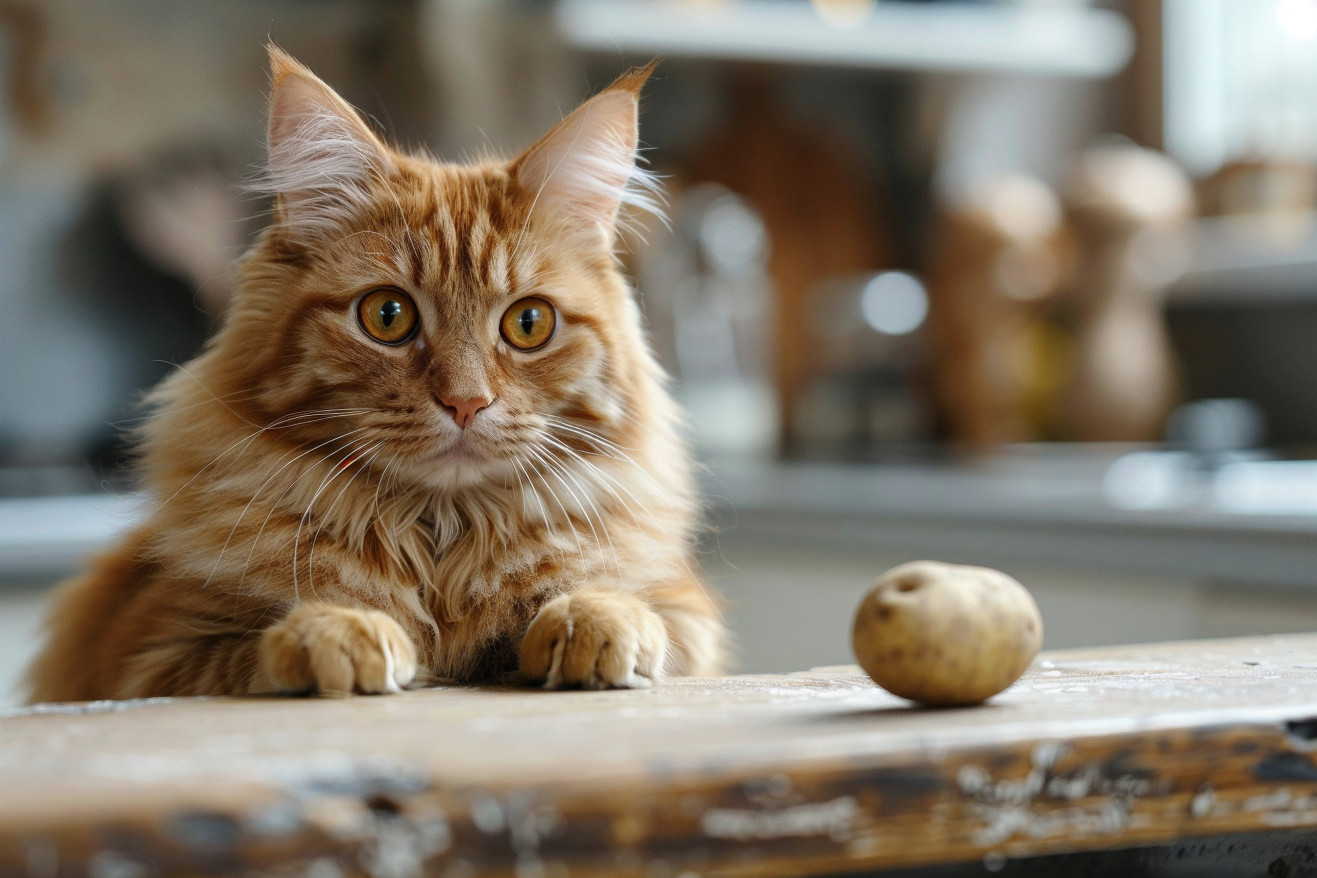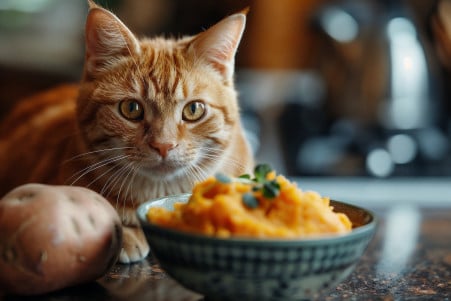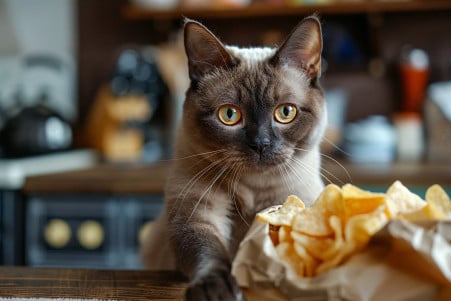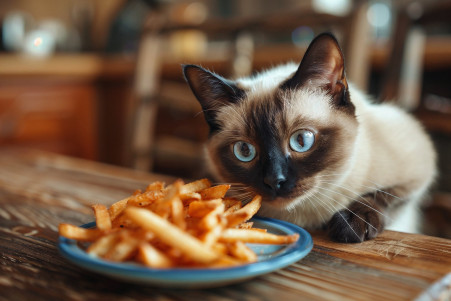Can Cats Eat Potatoes? Why This Nightshade Is Unsafe for Felines
9 April 2024 • Updated 8 April 2024

As you sit down to enjoy your baked potato, you might be tempted to share a few bites with your cat. However, the answer to the question "can cats eat potatoes?" is a firm no. That's because potatoes are part of the nightshade family of vegetables, all of which contain solanine, a compound that is toxic to cats. Even a small amount of potato can lead to digestive issues, including vomiting and diarrhea, in cats.
This article will look at the research of veterinarians, biologists, and pet nutritionists to explain why potatoes and other nightshades are bad for cats. In doing so, it will shed light on important aspects of feline physiology and nutrition that every cat owner should understand in order to ensure their pets are as healthy and happy as possible.
Can cats eat potatoes?
Solanine Toxicity: What You Need to Know About Potatoes and Cats
Solanine is a toxic substance that is found in potatoes, especially in potatoes that have greened or sprouted. According to a veterinary reference source, solanine is a glycoalkaloid poison that can lead to solanine poisoning in cats if it's ingested in large enough amounts. Cats are especially sensitive to solanine, so even small amounts of raw or undercooked potatoes that contain solanine can be dangerous.
The symptoms of solanine poisoning in cats are serious and can include vomiting, drooling, loss of appetite, lethargy, diarrhea, and even neurological symptoms like disorientation, according to Catster. If you see any of these symptoms in your cat after they've eaten potatoes, it's important to get them to the vet right away. Getting treatment quickly can help reduce the impact of the poisoning and prevent long-term problems.
To reduce the risk of solanine poisoning, make sure you store potatoes properly in a cool, dry place where your cat can't get to them. Also, don't feed your cat any potatoes that have greened, sprouted, or shriveled, as these are more likely to have higher levels of solanine and be more dangerous. While cooked potatoes are less likely to cause poisoning, it's still best to be careful and feed them to your cat in moderation if you decide to give them this occasional treat.
Cooked Potatoes: Can Cats Have Them?
Even though cooked, unseasoned potatoes are less toxic than raw potatoes for cats, they still come with some dangers and should only be given to cats in moderation as a special treat. According to Petco, potatoes do have some nutritional value for cats, including carbohydrates, vitamins, and minerals, but cats’ bodies aren’t built to properly digest and absorb these nutrients.
As Purina points out, cats are obligate carnivores and should get most of their nutrition from meat-based foods. That said, even cooked potatoes should never be a regular part of a cat’s diet, as eating them too often can lead to weight gain and other health problems.
To ensure that cooked potatoes are safe for cats, it’s important to make sure that no butter, oil, salt, or other seasonings are added to the potatoes before they’re given to cats, as these can lead to digestive problems or even toxicity. Catster suggests giving cats a small piece of plain, cooked potato to see how they react to it and only giving it to them as a treat, not a regular part of their diet.
Sweet Potatoes: A Better Option or Still a Concern?
Sweet potatoes may be a better option than white potatoes for cats, but they still come with some concerns and should not be a regular part of a cat's diet. According to BeChewy, the cooked flesh of sweet potatoes is safe for cats in small amounts and can help with digestion and make cats feel fuller. However, the high carbohydrate content of sweet potatoes can be a problem for cats, who are obligate carnivores and need a diet that's primarily made up of meat.
WagWalking explains that while cats may be able to get some nutritional value from sweet potatoes, they should only account for 5-10% of a cat's daily caloric intake. Cats should eat sweet potatoes in moderation to avoid obesity and other health problems. In addition, cats should not eat the skin or vines of sweet potatoes because they can cause digestive issues.
To feed sweet potatoes to cats, The Wildest suggests feeding cats cooked, mashed sweet potatoes that don't contain any salt, spices, or fats. Cats should not eat raw sweet potatoes or sweet potato fries because they can be a choking hazard and cause digestive problems. As with any new food, cats should be slowly introduced to sweet potatoes, and their reactions should be monitored.
While sweet potatoes may be a slightly better option than white potatoes, the potential risks still outweigh the potential benefits for most cats. Responsible pet owners should focus on feeding their cats a balanced, meat-based diet that meets their specific nutritional requirements.
Potato Chips and Other Fried Potato Products: A Hard Pass for Your Feline
Potato chips and other fried potato products are not good for cats and should be avoided. As reported by Catster, potato chips are loaded with saturated fats, salt, and carbohydrates, all of which are bad for cats and can lead to obesity and other health problems. The Vet Help Direct also warns that the high salt content in potato chips can lead to salt toxicity or sodium poisoning if cats eat too much of it.
Cats are obligate carnivores, which means they need to eat a diet that is primarily made up of meat to get the nutrients they need. As a result, according to Catster, potato chips don't contain the nutrients cats need and are basically worthless. Instead, pet parents should stick to giving their cats treats that are healthier and lower in fat, salt, and carbs, such as small pieces of cooked chicken or fish.
Mashed Potatoes and Other Potato Dishes: Use Caution
While cooked, unseasoned mashed potatoes are probably safer than raw or undercooked potatoes, they still come with some risks and should only be given to cats occasionally and in small amounts. Daily Paws explains that potatoes, even when cooked, have nutrients like carbohydrates that are hard for cats to digest and absorb because they are obligate carnivores.
It's important to make sure that you don't add any seasonings or other ingredients like garlic, onions, salt, or oregano to the mashed potatoes you give to your cat because they can be poisonous, according to Catster. Meanwhile, you should never give cats raw, green, or undercooked potatoes because they contain solanine and other substances that are toxic to cats.
To be safe, Catster suggests giving your cat a small taste of plain, boiled mashed potatoes and then waiting to see how they react. Meanwhile, you should make sure to keep the portion size small because potatoes should never be a big part of a cat's diet. If you take the right precautions, you and your cat can both enjoy mashed potatoes in moderation.
Conclusion: Making Sure Your Cat's Nutritional Needs Are Met
In conclusion, while cats can have small amounts of cooked, unseasoned potatoes as a treat from time to time, potatoes and potato products should not be a regular part of their diet. The potential dangers, including solanine poisoning and digestive problems, outweigh any potential benefits.
It's important for pet parents to make sure their cats are getting the balanced, meat-based diet they need as obligate carnivores. If you have any questions, talk to your vet or a pet nutritionist to make sure you're providing your cat with the care and nutrition they need to be healthy and happy.


